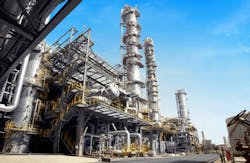Wealthy investors from the Arabian Gulf are eyeing markets in southeast Asia and investing huge sums of money in petrochemical production in the region, according to the biggest English-language newspaper in the Middle East, the National.
Having amassed serious funds as a result of the high oil prices over the past few years that brought increasing revenues to companies in Abu Dhabi and Qatar, they are more than willing to grow and expand to the Far Eastern countries that have surging populations and low workforce costs.
One of these companies is Qatar Holding, which recently revealed plans to invest $5 billion in a Malaysian petrochemicals complex, aiming to compete with Singapore's manufacturers. Another example is Dubai's Drydocks World, which announced it would build a $2.5 billion maritime complex to meet the needs of the industry in Indonesia. Simultaneously, Saudi Arabian Oil Company, also known as Saudi Aramco, is studying the possibility of acquiring a refining and petrochemical complex in the Indonesian province of East Java, while Qatar Petroleum (QP) is buying a stake in a $4 billion Vietnamese petrochemical complex and Abu Dhabi's Borouge is opening plastics sales offices across southeast Asia.
Tony Potter, managing director at consultancy firm IHS Chemical, commented that this is now a major trend. Some of the biggest and richest businesses in the oil and petrochemical sectors are moving to the east and are not shy to invest, he added.
Many of these companies have already set foot in the region with previous deals in China. Three big players, Sinopec, Saudi Aramco and ExxonMobil, joined forces five years ago to invest $5 billion to upgrade a Chinese petrochemical complex and agreed to build 750 filling stations. A year later, Sinopec secured a strategic cooperation agreement with Saudi Basic Industries Corporation. In addition, Borouge, which is owned by Abu Dhabi National Oil Company and Austria's Borealis, opened its first resin plant in China in 2010 and decided to enhance its position on the market with a second one.
According to Abdulwahab Al Sadoun, the secretary general of the Gulf Petrochemical and Chemical Association in Dubai, over 60 percent of the total petrochemical export from the Gulf is intended for southeast Asia and China. That is why a migration in that direction is a logical next step for firms to strengthen their positions on the market.
Meanwhile, a number of U.S. companies that have been investing in China are currently re-evaluating their strategies and planning their next moves in light of a different prospect. As an ocean of cheap gas is being unlocked from American shale, industrial investments in the United States have climbed, making it the world's largest market for petrochemicals. Al Sadoun noted that the bigger U.S. investors that had been pouring money into China are reconsidering their plans for expansion.
